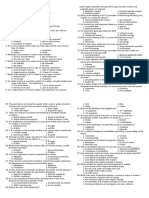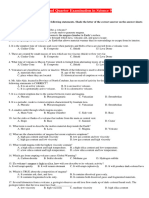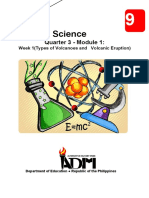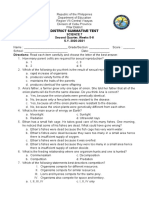0 ratings0% found this document useful (0 votes)
52 viewsSummative Test 3RD
Summative Test 3RD
Uploaded by
Carissa Mae Cañete1. The document contains a summative test on topics related to volcanoes, heat from the Earth's interior, stars, and climate.
2. It includes multiple choice and fill-in-the-blank questions testing identification, underlining key words, and choosing the correct order of steps from options given.
3. The questions cover characteristics of magma and volcanoes, how geothermal heat is used, why stars appear to move and have different colors, and factors that can decrease Earth's temperature.
Copyright:
© All Rights Reserved
Available Formats
Download as DOCX, PDF, TXT or read online from Scribd
Summative Test 3RD
Summative Test 3RD
Uploaded by
Carissa Mae Cañete0 ratings0% found this document useful (0 votes)
52 views1 page1. The document contains a summative test on topics related to volcanoes, heat from the Earth's interior, stars, and climate.
2. It includes multiple choice and fill-in-the-blank questions testing identification, underlining key words, and choosing the correct order of steps from options given.
3. The questions cover characteristics of magma and volcanoes, how geothermal heat is used, why stars appear to move and have different colors, and factors that can decrease Earth's temperature.
Original Description:
summative test grade 9 science
Original Title
SUMMATIVE TEST 3RD
Copyright
© © All Rights Reserved
Available Formats
DOCX, PDF, TXT or read online from Scribd
Share this document
Did you find this document useful?
Is this content inappropriate?
1. The document contains a summative test on topics related to volcanoes, heat from the Earth's interior, stars, and climate.
2. It includes multiple choice and fill-in-the-blank questions testing identification, underlining key words, and choosing the correct order of steps from options given.
3. The questions cover characteristics of magma and volcanoes, how geothermal heat is used, why stars appear to move and have different colors, and factors that can decrease Earth's temperature.
Copyright:
© All Rights Reserved
Available Formats
Download as DOCX, PDF, TXT or read online from Scribd
Download as docx, pdf, or txt
0 ratings0% found this document useful (0 votes)
52 views1 pageSummative Test 3RD
Summative Test 3RD
Uploaded by
Carissa Mae Cañete1. The document contains a summative test on topics related to volcanoes, heat from the Earth's interior, stars, and climate.
2. It includes multiple choice and fill-in-the-blank questions testing identification, underlining key words, and choosing the correct order of steps from options given.
3. The questions cover characteristics of magma and volcanoes, how geothermal heat is used, why stars appear to move and have different colors, and factors that can decrease Earth's temperature.
Copyright:
© All Rights Reserved
Available Formats
Download as DOCX, PDF, TXT or read online from Scribd
Download as docx, pdf, or txt
You are on page 1of 1
SUMMATIVE TEST
I. Identification. a. heat c. acid rain
1. Is the property of the material’s resistance to b. light d. volcanic ash
flow 5. Which of the following are active volcanoes?
2. A type of volcanic eruption that shows I. Mayon in Albay
periodic weak to violent eruption characterized II.Taal in Batangas
by fountain lava III. Vulcan in Camiguin
3. Is an energy coming from the heat of the IV. Kanlaon in Negros Oriental
Earth’s interior.
4. Use the heat coming from close to the a. I and II only c. I, II, and III only
Earth’s surface to heat water or to provide heat b. II and III only d. I, II, and IV only
for buildings. 6. Which of the following shows the correct steps on
5. Is a type of volcano with nearly perfect how heat from the Earth’s interior is tapped as source of
sloped structure formed form alternate electricity in a power plant?
solidification of both lava and pyroclastic I. Steam causes the turbine to turn
deposits. II. heat causes the water to turn into
II. Underline the word/s that best complete the steam
sentence. III. heat from inside the Earth
1. Magmas with high silica content are (more, less) IV. generator changes the mechanical
viscous than those with low silica content. energy to electrical energy
2. The higher the temperature of magma the (higher, a. IV-III-II-I c. IV-I_II-III
b. III-II-I-IV d. II-III-I-IV
lower) is its viscosity.
7. How do stars appear to move in the night sky?
3. The more viscous and thicker the material the (lesser,
A. From East to West
greater) is its resistance to flow. B. From North to South
4. The speed of the flow depends on the (quickness, C. From West to East
thickness) of the lava. D. From South to North
5. The (thicker, thinner) the lava, the faster it moves.
8. Stars appear to move uin the sky because
A. The Earth is rotating.
III. Multiple Choice. Choose the best answer from the B. The night sky is rotating
given options. Encircle the letter of your choice. C. The Universe is expanding.
1. It is a type of eruption characterized by tall eruption D. New galaxies are formed.
columns that reach up to 20km high with pyroclastic 9. If you are located at the North Pole, where will you
flow and ash fall tephra. see the Polaris?
a. Plinian c. Strombolian A. Overhead
b. Vulcanian d. Phreotomagmatic B. Around 450 from the horizon
2. Which characteristic of magma mainly determines its C. Just above the horizon
explosiveness? D. Polaris will not be seen in the North Pole
a. silica content c. amount 10. Why do stars have colors?
b. temperature d. color A. It is because of the presence of oxygen.
3. Which of the following characteristics of a volcano B. It is because of the presence of carbon
depends on its magma emission? dioxide.
a. age c. shape C. It is because of varied temperatures.
b. size d. location D. It is because of the different locations.
4. Which of the following factors associated with huge
volcanic eruptions may cause the decrease in the Earth’s
average temperature for a few years?
You might also like
- Essemtials of Soil Mechanics and Foundation Basic Geotechnics David F.McCarthy PDFDocument847 pagesEssemtials of Soil Mechanics and Foundation Basic Geotechnics David F.McCarthy PDFCreation Your83% (6)
- L A V A: Division of Romblon Third Quarterly Test Grade 9 SCIENCEDocument7 pagesL A V A: Division of Romblon Third Quarterly Test Grade 9 SCIENCEWilma CaibanNo ratings yet
- Science 9 3rd Grading ExamDocument6 pagesScience 9 3rd Grading ExamJessica Rosatase Gemang100% (2)
- Pre-Test Earth and Life Science: Name: Score: /40 Year and Section: DateDocument2 pagesPre-Test Earth and Life Science: Name: Score: /40 Year and Section: DateMALOU ELEVERANo ratings yet
- 3rd QUARTER MODULE I SUMMATIVE TEST SY 2022 2023Document4 pages3rd QUARTER MODULE I SUMMATIVE TEST SY 2022 2023ian NatividadNo ratings yet
- Recitation PTSDocument3 pagesRecitation PTSMPY Reyes54No ratings yet
- 3rdpt Science9Document4 pages3rdpt Science9John Ritchel CarinoNo ratings yet
- Volcano Long QuizDocument2 pagesVolcano Long Quizivan.demouploadNo ratings yet
- 3rd Quarter Test Science9Document4 pages3rd Quarter Test Science9VIMSON ALASTRANo ratings yet
- Q3 ExamDocument5 pagesQ3 Examagrancho09No ratings yet
- G9 Sy 2019 2020 TQ Q3Document4 pagesG9 Sy 2019 2020 TQ Q3Owen LindayanNo ratings yet
- Science - Grade 9 MULTIPLE CHOICE: Choose The Letter of The Correct AnswerDocument4 pagesScience - Grade 9 MULTIPLE CHOICE: Choose The Letter of The Correct AnswerBenson Corneja100% (1)
- Reviewer in ScienceDocument2 pagesReviewer in ScienceMaria Zaira L. RiveraNo ratings yet
- S9 - q2 - Summative Test 1Document6 pagesS9 - q2 - Summative Test 1Rex AguaNo ratings yet
- Volcanoes Summative TestDocument2 pagesVolcanoes Summative Testjoan marie Pelias100% (3)
- Q3 SCIENCE 9 Periodical Test - Review TestDocument4 pagesQ3 SCIENCE 9 Periodical Test - Review TestOclarit Joseph CarlNo ratings yet
- 1st Summative Test G9Document1 page1st Summative Test G9Dixie FinchNo ratings yet
- Grade 9 Science 3rd GradingDocument8 pagesGrade 9 Science 3rd GradingJeanne Fornal Galiga100% (1)
- I. Read The Statements or Questions Carefully and Then Shade The Letter of The Correct Answer From The Choices Given Before Each NumberDocument3 pagesI. Read The Statements or Questions Carefully and Then Shade The Letter of The Correct Answer From The Choices Given Before Each NumberMara M. LabanderoNo ratings yet
- Q3 Volcano - Summative TestDocument15 pagesQ3 Volcano - Summative TestLily Anne CerilloNo ratings yet
- Reviewer in Science 9Document7 pagesReviewer in Science 9rogon mhikeNo ratings yet
- ScienceDocument6 pagesScienceNiel John GenteroyNo ratings yet
- Quiz For Types of VolcanoesDocument1 pageQuiz For Types of Volcanoesjerieljade.talabonNo ratings yet
- Science 9 Quarter IIIDocument2 pagesScience 9 Quarter IIIArvin Arne Rodrigo67% (3)
- Science: Quarter 3 - Module 1: Types and Characteristics of VolcanoesDocument24 pagesScience: Quarter 3 - Module 1: Types and Characteristics of VolcanoesShawn DomingoNo ratings yet
- Post Test Multiple Choice. Read Each Item Carefully and Choose Shade Your Answer in A Separate Answer Sheet Provided To YouDocument2 pagesPost Test Multiple Choice. Read Each Item Carefully and Choose Shade Your Answer in A Separate Answer Sheet Provided To YouJohn EdselNo ratings yet
- Summative Q3 Science Week 1 and 2Document4 pagesSummative Q3 Science Week 1 and 2Ana Maureen CuarteronNo ratings yet
- Q4 - Grade5 TestDocument3 pagesQ4 - Grade5 TestAlyssa F. DapadapNo ratings yet
- Q3 First Summative sci 9Document1 pageQ3 First Summative sci 9rosalynnav75No ratings yet
- Earth & Life Science: First Quarter-Module 5: Geologic Processes That Occur Within The EarthDocument46 pagesEarth & Life Science: First Quarter-Module 5: Geologic Processes That Occur Within The Earthdave lorenzeNo ratings yet
- Summative Test Grade 9Document5 pagesSummative Test Grade 9janselmbcNo ratings yet
- 1st Periodical Test Earth and Life Science 2022-2023Document5 pages1st Periodical Test Earth and Life Science 2022-2023Marfe MontelibanoNo ratings yet
- Earth and Life Science Mid-Term ExamDocument5 pagesEarth and Life Science Mid-Term Examcristina maquintoNo ratings yet
- ELS_2nd Quarter ExamDocument2 pagesELS_2nd Quarter Examtd.gascon1No ratings yet
- Review 3rd QuarterDocument2 pagesReview 3rd QuarterasmaruhomNo ratings yet
- Earth and Life Science - Grade 11,12 - Test QuestionsDocument8 pagesEarth and Life Science - Grade 11,12 - Test QuestionsNice D. ElseNo ratings yet
- Summative Test No. 1Document3 pagesSummative Test No. 1angelrosecordova12292018No ratings yet
- Pre Test Earth and Life ScienceDocument2 pagesPre Test Earth and Life ScienceAira A. BaylanNo ratings yet
- 1st Periodical Test Earth and Life Science 2022-2023Document5 pages1st Periodical Test Earth and Life Science 2022-2023cristina maquintoNo ratings yet
- UPCAT 2015 - SIMULATED EXAM - SET A - SECTION 2 - SCIENCE PROFICIENCY v.4.16.2015Document9 pagesUPCAT 2015 - SIMULATED EXAM - SET A - SECTION 2 - SCIENCE PROFICIENCY v.4.16.2015Puffer FischeNo ratings yet
- Multiple Choice TestDocument3 pagesMultiple Choice Testedelmae.camaongayNo ratings yet
- Pre Test Sci 9Document2 pagesPre Test Sci 9Bryan RealuyoNo ratings yet
- Quiz VolcanoesDocument1 pageQuiz Volcanoesdaivey.ugaddanNo ratings yet
- SCIENCE 9 3rd QUARTER REVIEWER VOLCANOESDocument6 pagesSCIENCE 9 3rd QUARTER REVIEWER VOLCANOESNathan De GranoNo ratings yet
- Third Quarter Examination Science 9 23-24Document3 pagesThird Quarter Examination Science 9 23-24Ma Carmela DanganNo ratings yet
- Graded RecitationDocument3 pagesGraded RecitationJenny Acosta CatacutanNo ratings yet
- Quarter 3 - Week 1 & 2 Lesson PlanDocument3 pagesQuarter 3 - Week 1 & 2 Lesson PlanAaron AsneNo ratings yet
- 1Document3 pages1Roceline AtienzaNo ratings yet
- 1st PT Science 18-19Document7 pages1st PT Science 18-19jennette salesNo ratings yet
- Detailed Lesson Plan inDocument12 pagesDetailed Lesson Plan injellyB Rafael100% (1)
- Sci Reviewer Q3Document3 pagesSci Reviewer Q3Julia BorjaNo ratings yet
- Summative qrt3Document3 pagesSummative qrt3Yancy JumamilNo ratings yet
- Second Quarterly Exam in Science 5: Will Be Mark As Wrong. Matuto Kang Maging Maingat! Wag Padalos-DalosDocument2 pagesSecond Quarterly Exam in Science 5: Will Be Mark As Wrong. Matuto Kang Maging Maingat! Wag Padalos-DalosAlyssa F. DapadapNo ratings yet
- q3 Science 9 ExamDocument4 pagesq3 Science 9 ExamLorna MarollanoNo ratings yet
- Envo CHAPTER 5Document17 pagesEnvo CHAPTER 5Rey MapaladNo ratings yet
- Science: Quarter 3 - Module 1Document17 pagesScience: Quarter 3 - Module 1NRIZA MAE CACHONo ratings yet
- SCIENCE 9 3rd Quarter QuestionnaireDocument3 pagesSCIENCE 9 3rd Quarter QuestionnaireBert RoseteNo ratings yet
- Lumbang Integrated National High SchoolDocument5 pagesLumbang Integrated National High SchoolLorena DizonNo ratings yet
- Science8 TestDocument5 pagesScience8 TestJamaica JavellanaNo ratings yet
- Dispersions-608177: Teacher-Made Learner's Home TaskDocument4 pagesDispersions-608177: Teacher-Made Learner's Home TaskCarissa Mae CañeteNo ratings yet
- Is-A-Solution/: Teacher-Made Learner's Home TaskDocument2 pagesIs-A-Solution/: Teacher-Made Learner's Home TaskCarissa Mae CañeteNo ratings yet
- We-Care/greenhouse-Gases .PDF: Teacher-Made Learner's Home TaskDocument4 pagesWe-Care/greenhouse-Gases .PDF: Teacher-Made Learner's Home TaskCarissa Mae CañeteNo ratings yet
- Mixture/: Teacher-Made Learner's Home TaskDocument4 pagesMixture/: Teacher-Made Learner's Home TaskCarissa Mae CañeteNo ratings yet
- S7MT-id-e-2: Common Elements and Their Uses Element Common Uses &/or DescriptionsDocument4 pagesS7MT-id-e-2: Common Elements and Their Uses Element Common Uses &/or DescriptionsCarissa Mae CañeteNo ratings yet
- Teacher-Made Learner's Home Task: S7MT-ib-c-3 S7MT-id-e-2Document4 pagesTeacher-Made Learner's Home Task: S7MT-ib-c-3 S7MT-id-e-2Carissa Mae CañeteNo ratings yet
- Mixtures/ Mixture/: Teacher-Made Learner's Home TaskDocument3 pagesMixtures/ Mixture/: Teacher-Made Learner's Home TaskCarissa Mae CañeteNo ratings yet
- Enclosure 4. Teacher-Made Learner's Home Task: 7MT-Ia-1Document4 pagesEnclosure 4. Teacher-Made Learner's Home Task: 7MT-Ia-1Carissa Mae CañeteNo ratings yet
- Percent by Volume Volume Percent or Volume/volume Percent (V/V%) Is Used WhenDocument3 pagesPercent by Volume Volume Percent or Volume/volume Percent (V/V%) Is Used WhenCarissa Mae CañeteNo ratings yet
- Enclosure 4. Teacher-Made Learner's Home Task: 7MT-Ia-1Document3 pagesEnclosure 4. Teacher-Made Learner's Home Task: 7MT-Ia-1Carissa Mae CañeteNo ratings yet
- SLHT Week 1 EditedDocument16 pagesSLHT Week 1 EditedCarissa Mae CañeteNo ratings yet
- Enclosure 4. Teacher-Made Learner's Home Task: 7MT-Ia-1Document4 pagesEnclosure 4. Teacher-Made Learner's Home Task: 7MT-Ia-1Carissa Mae CañeteNo ratings yet
- Science 7 Summative Test With Answer Key Weeks 5-8Document2 pagesScience 7 Summative Test With Answer Key Weeks 5-8Carissa Mae Cañete100% (1)
- Enclosure 4. Teacher-Made Learner's Home Task: 7MT-Ia-1Document2 pagesEnclosure 4. Teacher-Made Learner's Home Task: 7MT-Ia-1Carissa Mae CañeteNo ratings yet
- Enclosure 4. Teacher-Made Learner's Home Task: 7MT-Ia-1Document3 pagesEnclosure 4. Teacher-Made Learner's Home Task: 7MT-Ia-1Carissa Mae Cañete0% (1)
- Name: - Gr. & Sec.: - Date: - ScoreDocument8 pagesName: - Gr. & Sec.: - Date: - ScoreCarissa Mae CañeteNo ratings yet
- SUMMATIVE TEST Climate Answer KeyDocument2 pagesSUMMATIVE TEST Climate Answer KeyCarissa Mae Cañete100% (3)
- Kinematic Equations Sample ProblemsDocument2 pagesKinematic Equations Sample ProblemsCarissa Mae CañeteNo ratings yet
- Subject Teacher: Gilbert A. Narte Subject Teacher: Gilbert A. NarteDocument1 pageSubject Teacher: Gilbert A. Narte Subject Teacher: Gilbert A. NarteCarissa Mae CañeteNo ratings yet
- Science Assessment 3Document1 pageScience Assessment 3Carissa Mae CañeteNo ratings yet
- Name: - Gr. & Sec.: - Date: - ScoreDocument8 pagesName: - Gr. & Sec.: - Date: - ScoreCarissa Mae CañeteNo ratings yet
- SUMMATIVE TEST Climate Answer KeyDocument2 pagesSUMMATIVE TEST Climate Answer KeyCarissa Mae CañeteNo ratings yet
- Kinematic Equations Sample ProblemsDocument2 pagesKinematic Equations Sample ProblemsCarissa Mae CañeteNo ratings yet
- I. Definition:: Endogenic ProcessesDocument10 pagesI. Definition:: Endogenic ProcessesJepoy Nisperos ReyesNo ratings yet
- Semi Detailed Lesson Plan Orquina Bsedsci 3Document6 pagesSemi Detailed Lesson Plan Orquina Bsedsci 3Wiljoyce SanchezNo ratings yet
- Smith Volcano (Mt. Babuyan) 4 KM To The NW of Babuyan Claro Is The Youngest Volcano On TheDocument4 pagesSmith Volcano (Mt. Babuyan) 4 KM To The NW of Babuyan Claro Is The Youngest Volcano On TheJaybee CabadduNo ratings yet
- Activity Volcanic Landforms and Eruptive StylesDocument2 pagesActivity Volcanic Landforms and Eruptive StylesJennifer R. BarcelonaNo ratings yet
- Detailed Lesson Plan in Science 1Document11 pagesDetailed Lesson Plan in Science 1delacruzcaasimikejustinleeNo ratings yet
- Science9 Q3 SLM3Document15 pagesScience9 Q3 SLM3Zandra Musni Delos Reyes100% (1)
- Detailed Lesson Plan 1Document2 pagesDetailed Lesson Plan 1Fria mae AbellanoNo ratings yet
- Science 9 Q3 Module 5Document4 pagesScience 9 Q3 Module 5Arthur CapawingNo ratings yet
- Đề Thi Thử 3Document3 pagesĐề Thi Thử 3bohucNo ratings yet
- Eng'g Geology Notes 3Document15 pagesEng'g Geology Notes 3Angelo Cecilio BasconNo ratings yet
- Intrusive Volcanic LandformsDocument4 pagesIntrusive Volcanic LandformsanshikchaurasiyaanshNo ratings yet
- Geography Class XIDocument17 pagesGeography Class XISanthosh KumarNo ratings yet
- Year 9 ScienceDocument7 pagesYear 9 ScienceAmarpreet KaurNo ratings yet
- Everyday Science MCQs For CCE 2018-1 PDFDocument17 pagesEveryday Science MCQs For CCE 2018-1 PDFAnaya KhanNo ratings yet
- IGCSE - Geography 0460 Theory NotesDocument23 pagesIGCSE - Geography 0460 Theory NotesPiet Bosch100% (2)
- DRRR - Q1 - Module 7Document11 pagesDRRR - Q1 - Module 7Leovil E. InteNo ratings yet
- Lecture Volcanic EruptionDocument2 pagesLecture Volcanic EruptionMarlon EllamilNo ratings yet
- Chapter 3: Natural Hazards, Mitigation and Adaptation: A. EarthquakeDocument6 pagesChapter 3: Natural Hazards, Mitigation and Adaptation: A. EarthquakeJac Nama Garcia100% (4)
- Journal of African Earth Sciences: A B C A D e e A FDocument12 pagesJournal of African Earth Sciences: A B C A D e e A FDzirana Sekar ArumNo ratings yet
- Factors Science-Based Knowledge Indigenous Knowledge IntegrationDocument2 pagesFactors Science-Based Knowledge Indigenous Knowledge IntegrationsuzuechiNo ratings yet
- DEEP BLUE Edition BLAZING RED Edition: RRI - RED - RULEBOOK - ENG - HG - v02 - 20202205 - LUMA - Indd 1Document12 pagesDEEP BLUE Edition BLAZING RED Edition: RRI - RED - RULEBOOK - ENG - HG - v02 - 20202205 - LUMA - Indd 1Andy StraussNo ratings yet
- Parts of VolcanoDocument2 pagesParts of VolcanoTrixie DiazNo ratings yet
- Thermal and Pressure Change-: Exposed To Water and Gases in TheDocument11 pagesThermal and Pressure Change-: Exposed To Water and Gases in TheDonna Libres100% (1)
- Download ebooks file (eBook PDF) Essentials of Geology 13th Edition by Frederick all chaptersDocument46 pagesDownload ebooks file (eBook PDF) Essentials of Geology 13th Edition by Frederick all chaptersinkerrashdi100% (2)
- ELS Final Module 7 08082020 - 022915Document26 pagesELS Final Module 7 08082020 - 022915CelerinaRusianaLonodNo ratings yet
- DSSSB JE PAPER 28 JUNE 2022 SHIFT3 Evening Civil JunctionDocument45 pagesDSSSB JE PAPER 28 JUNE 2022 SHIFT3 Evening Civil JunctionSAHIL ANTILNo ratings yet
- Chapter 9Document29 pagesChapter 9Danny TNo ratings yet
- Volcanoes FDocument47 pagesVolcanoes Fsaksham111No ratings yet
- Earth Science Q1 Module 4Document11 pagesEarth Science Q1 Module 4Jinn Allan LuañaNo ratings yet















































































































